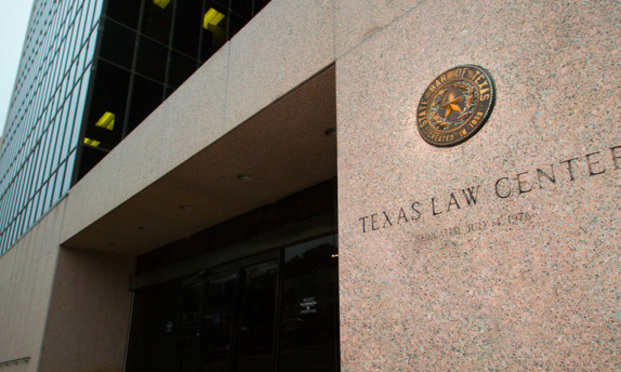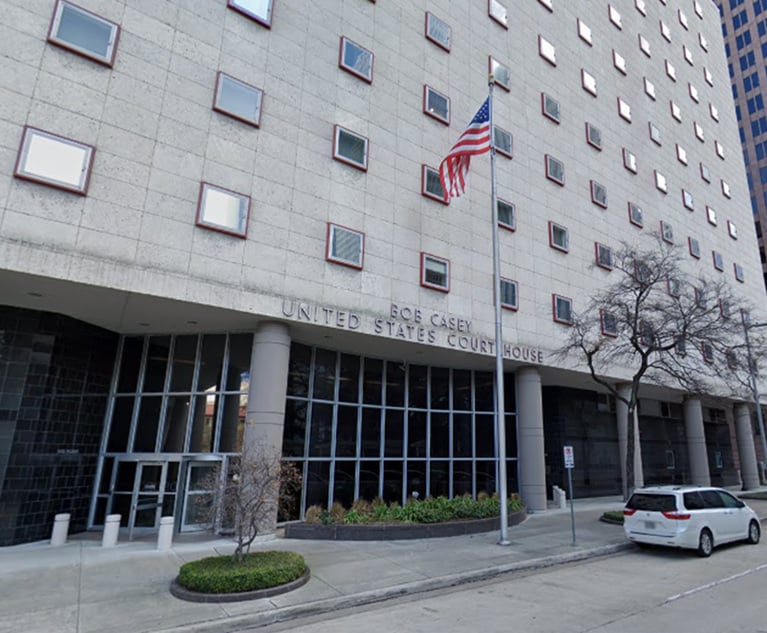State Bar to Ask Appeals Court to Revive Discipline Case Against Austin Lawyer
In appellate briefs, Omar Rosales' lawyers argued that the State Bar of Texas' disciplinary action against him is barred by the state's anti-SLAPP law, and that he is the target of an orchestrated attack on his ADA-compliance practice.
February 11, 2019 at 03:24 PM
6 minute read
 The State Bar of Texas, Austin. Photo: Joel Salcido
The State Bar of Texas, Austin. Photo: Joel Salcido
A panel of Texas' Third District Court of Appeals judges will hear arguments Wednesday in a case pitting the State Bar of Texas' Commission for Lawyer Discipline against an Austin lawyer fighting sanctions over allegedly abusive litigation tactics targeting businesses for Americans with Disabilities Act violations.
The commission said attorney Omar Weaver Rosales engaged in dishonest and frivolous litigation by threatening to sue website operators for baseless ADA violations unless they paid him $2,000 to go away. Rosales himself claims to have suffered injuries while in the military that left him with mental and physical disabilities.
Rosales has thus far succeeded in beating back the commission's effort to sanction him, convincing a trial judge to dismiss the complaint as a violation of the Texas Citizens Participation Act, the state's anti-SLAPP statute barring litigation found to be in violation of a defendant's “right to free speech, right to petition, or right of association.”
The lower court also awarded Rosales $65,872 in attorney fees for defending himself against the commission.
But Rosales' record of avoiding discipline for abusive litigation is not perfect: The Fifth Circuit Court of Appeals last year upheld an order banning Rosales from the U.S. District Court in Texas' Western District—his home jurisdiction—for abusive tactics in a half-dozen cases alleging that businesses were in violation of the ADA.
The court also awarded more than $175,000 in fees and expenses, which the appellate panel approved.
Rosales appealed that ruling to the U.S. Supreme Court, which declined to hear it.
As detailed in appellate briefs, the disciplinary action being argued Tuesday centers on a series of letters Rosales sent to medical service providers claiming their websites were not ADA compliant.
But the alleged violations were in fact suggested best practices from a Department of Justice “toolkit” that “specifically disclaims that it is required under the ADA,” said the commission's brief. “Notably, Rosales himself has since publicly stated that the law in this area is unsettled.”
“Then, the threats begin,” said the brief, filed by the bar's Executive Counsel Linda Acevedo and Deputy Counsel Laura Popps, and appellate counsel Matthew Greer, who will argue the appeal.
“The letters threaten a lawsuit with a draft complaint attached. They state that the provider must self-report these 'violations' to the United States Department of Health and Human Services and forfeit all federal funds” and that “Rosales will contact DHHS to initiate a qui tam lawsuit.”
“Of course,” it said.” all of these dire consequences can be cured by paying Rosales the sum of $2,000.”
One case Rosales took to court was dismissed for lack of standing when a judge ruled “there was no explanation as to why or how Rosales' disability prevented him from accessing the website, and no indication that Rosales actually sought to be a patient of the provider, other than to file a lawsuit against it,” the brief said.
Seven complaints were filed with the bar, which sought sanctions against Rosales for five alleged violations: engaging in conduct involving dishonesty, fraud, deceit or misrepresentation; practicing under a trade name; stating or implying an ability to influence improperly a government agency or official; threatening medical providers with possible disciplinary actions in order to gain an advantage; and asserting frivolous claims in violation of Texas bar rules.
Rosales filed a motion to dismiss under the TCPA in Travis County District Court, which was granted by Judge R.H Wallace.
The commission brief argued that the TCPA “expressly states that it does not apply to government enforcement actions,” and that of 28 other other states with anti-SLAPP laws, it has been “unable to identify any other court that held it to be a defense to lawyer discipline, with several holding to the contrary.”
The commission is also protected by sovereign immunity, the bar argued.
And even if the court does decide the TCPA applies, it said, the commission presented a prima facie case that Rosales actions violated at least four bar rules. The trial court also erred in granting fees based on billing statements that were “entirely redacted” and insufficient to support the award, it said.
Rosales is represented by West, Webb, Allbritton & Gentry attorneys Gaines West and John “Jay” Rudinger Jr., who is arguing the appeal.
Rosales' brief said that no case law supports the proposition that the TCPA does not apply to lawyer discipline or government enforcement actions, and that the Texas Supreme Court “recently determined that sovereign immunity is inapplicable in a TCPA action.”
The bar violations alleged by the commission are unsupported “by any evidence, much less clear and specific evidence, to establish its prima facie case,” Rosales' lawyers argued.
Rosales' brief said has filed hundreds of ADA lawsuits over the years “in an effort to bring Austin-area businesses into compliance” with the law.
His $2,000 settlement demands are “exactly the same type of demand that plaintiffs lawyers send every day—the opposing party is notified of its wrongdoing and afforded an opportunity to enter into negotiations to rectify the situation or be sued,” it said.
Rosales brief said his efforts were “maligned in the media as 'exploitative' and akin to shakedown.”
He argued that he was targeted by the bar at the request of one of the lawyers who successfully had him sanctioned and barred from the Western District.
“Rosales' most vocal critic was Austin-based attorney James 'Jim' Harrington,” his brief said. “Harrington rallied his 'troops' to try and derail Rosales efforts, aiding in organizing the website-related complaints at issue in this lawsuit.”
“These grievances were an attempt to coerce Rosales into dropping the matters and not filing lawsuits, under the guise of perpetuating a narrative that Rosales' ADA compliance practice is merely a get-rich-quick scheme. The [commission] took up the 'torch' and filed the underlying lawsuit in order to intimidate and coerce him not to file his lawsuits.”
Neither Rosales not his attorneys responded to requests for comment.
This content has been archived. It is available through our partners, LexisNexis® and Bloomberg Law.
To view this content, please continue to their sites.
Not a Lexis Subscriber?
Subscribe Now
Not a Bloomberg Law Subscriber?
Subscribe Now
NOT FOR REPRINT
© 2025 ALM Global, LLC, All Rights Reserved. Request academic re-use from www.copyright.com. All other uses, submit a request to [email protected]. For more information visit Asset & Logo Licensing.
You Might Like
View All
JCPenney Seeks Return of More Than $1.1M From Jackson Walker For Bankruptcy Work
3 minute read
Ex-Appellate Court Judges Launch Boutique Focused on Plaintiffs Appeals
2 minute read
O'Melveny, White & Case, Skadden Beef Up in Texas With Energy, Real Estate Lateral Partner Hires
5 minute read
Chamberlain Hrdlicka Taps a New Leader as Firm Follows Succession Planning Path
3 minute readTrending Stories
- 1Ex-Kline & Specter Associate Drops Lawsuit Against the Firm
- 2Am Law 100 Lateral Partner Hiring Rose in 2024: Report
- 3The Importance of Federal Rule of Evidence 502 and Its Impact on Privilege
- 4What’s at Stake in Supreme Court Case Over Religious Charter School?
- 5People in the News—Jan. 30, 2025—Rubin Glickman, Goldberg Segalla
Who Got The Work
J. Brugh Lower of Gibbons has entered an appearance for industrial equipment supplier Devco Corporation in a pending trademark infringement lawsuit. The suit, accusing the defendant of selling knock-off Graco products, was filed Dec. 18 in New Jersey District Court by Rivkin Radler on behalf of Graco Inc. and Graco Minnesota. The case, assigned to U.S. District Judge Zahid N. Quraishi, is 3:24-cv-11294, Graco Inc. et al v. Devco Corporation.
Who Got The Work
Rebecca Maller-Stein and Kent A. Yalowitz of Arnold & Porter Kaye Scholer have entered their appearances for Hanaco Venture Capital and its executives, Lior Prosor and David Frankel, in a pending securities lawsuit. The action, filed on Dec. 24 in New York Southern District Court by Zell, Aron & Co. on behalf of Goldeneye Advisors, accuses the defendants of negligently and fraudulently managing the plaintiff's $1 million investment. The case, assigned to U.S. District Judge Vernon S. Broderick, is 1:24-cv-09918, Goldeneye Advisors, LLC v. Hanaco Venture Capital, Ltd. et al.
Who Got The Work
Attorneys from A&O Shearman has stepped in as defense counsel for Toronto-Dominion Bank and other defendants in a pending securities class action. The suit, filed Dec. 11 in New York Southern District Court by Bleichmar Fonti & Auld, accuses the defendants of concealing the bank's 'pervasive' deficiencies in regards to its compliance with the Bank Secrecy Act and the quality of its anti-money laundering controls. The case, assigned to U.S. District Judge Arun Subramanian, is 1:24-cv-09445, Gonzalez v. The Toronto-Dominion Bank et al.
Who Got The Work
Crown Castle International, a Pennsylvania company providing shared communications infrastructure, has turned to Luke D. Wolf of Gordon Rees Scully Mansukhani to fend off a pending breach-of-contract lawsuit. The court action, filed Nov. 25 in Michigan Eastern District Court by Hooper Hathaway PC on behalf of The Town Residences LLC, accuses Crown Castle of failing to transfer approximately $30,000 in utility payments from T-Mobile in breach of a roof-top lease and assignment agreement. The case, assigned to U.S. District Judge Susan K. Declercq, is 2:24-cv-13131, The Town Residences LLC v. T-Mobile US, Inc. et al.
Who Got The Work
Wilfred P. Coronato and Daniel M. Schwartz of McCarter & English have stepped in as defense counsel to Electrolux Home Products Inc. in a pending product liability lawsuit. The court action, filed Nov. 26 in New York Eastern District Court by Poulos Lopiccolo PC and Nagel Rice LLP on behalf of David Stern, alleges that the defendant's refrigerators’ drawers and shelving repeatedly break and fall apart within months after purchase. The case, assigned to U.S. District Judge Joan M. Azrack, is 2:24-cv-08204, Stern v. Electrolux Home Products, Inc.
Featured Firms
Law Offices of Gary Martin Hays & Associates, P.C.
(470) 294-1674
Law Offices of Mark E. Salomone
(857) 444-6468
Smith & Hassler
(713) 739-1250






